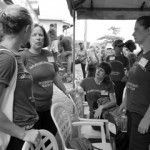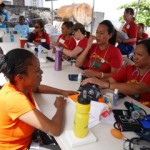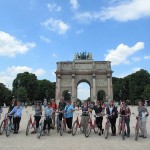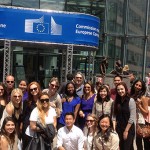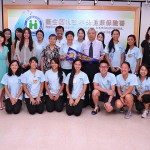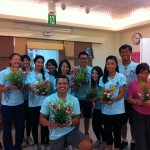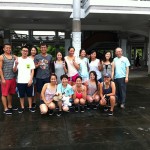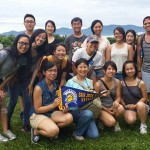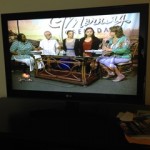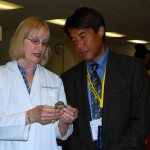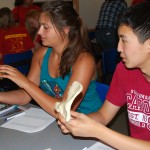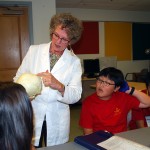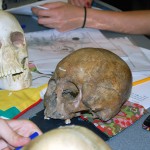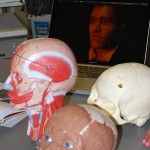
Alice Hines, right, meets with representatives at partner universities in Vietnam as part of the Social Work Education Enhancement Program.
Alice Hines, Interim Dean
Dr. Alice Hines took over the top administrative role in San José State University’s College of Applied Sciences and Arts as interim dean on July 1, 2014, after three years of serving as an Associate Dean for the College. In her three years as an Associate Dean, Hines oversaw curriculum and scheduling processes for the college, reviewed student petitions, and worked closely with departments and schools to foster international partnerships. She is the co-director of the Social Work Education Enhancement Program, which is funded with a grant from USAID to provide Social Work training for educators in Vietnam. She and her team hosted a fellowship and conference in 2013-14 that brought representatives from partner universities in Vietnam to SJSU for intensive training. In her role, she has also traveled to Vietnam to visit the partner universities.
As Associate Dean, Hines helped to shepherd in a new scholarship with donor Helen L. Stevens, dedicated to supplementing the cost of faculty-led study abroad programs. For the first year, Stevens donated 12- $500 scholarships to CASA students enrolled in faculty-led study abroad programs for the summer. Hines has expressed a dedication to continued expansion of the international experience initiative in the College beyond the first three pilot programs started this summer so more CASA students have the opportunity to study in other countries.
Before joining the dean’s office staff, Hines worked in the School of Social Work, where her scholarly work focused on: substance abuse and risk of AIDS, particularly among ethnic and cultural minority groups; methodological issues in research especially as they pertain to diverse cultural and ethnic groups; and, research on child and family-related issues with a particular focus on examining family-based correlates of adolescent and young adult development. She served as director of the School of Social work from 2005-2011. Hines has an M.S.W and Ph.D from the University of California, Berkeley.
Pamela Richardson, Acting Associate Dean

Dr. Pamela Richardson joined the Dean’s Office staff for the College of Applied Sciences and Arts in July as acting associate chair.
Pamela Richardson joined the College of Applied Sciences and Arts, Dean’s Office staff as Acting Associate Dean in July 2014. As acting associate dean, she will have a role in facilitating curriculum development, scheduling and the expansion of international programs for the College. She served as Chair of the Department of Occupational Therapy for the past two years, coordinating a major curriculum revision and program update. Dr. Richardson is a member of the Board of Directors of the National Board for Certification in Occupational Therapy and is a Fellow of the American Occupational Therapy Association. Dr. Richardson was the 2011 Honored Lecturer for the California Foundation for Occupational Therapy and received the California Occupational Therapy Association Award of Excellence in 2013.
Dr. Richardson, PhD, OTR/L, FAOTA, earned her Bachelor of Science degree in Occupational Therapy from the University of Puget Sound in Tacoma , Wash.; a Master of Science degree in Rehabilitation Medicine and a Ph.D in Early Childhood Special Education/ Rehabilitation Medicine from the University of Washington, in Seattle. Her research and clinical interests include social participation of children with disabilities, play-based and peer-mediated interventions for children with autism, family-centered therapy services, occupational justice issues for youth, transition services for youth with autism, international occupational therapy practice and online teaching. She has taught and presented recently from the inaugural interdisciplinary study abroad course focused on community health in Grenada with OT and nursing faculty and students. She developed and managed a bilateral study abroad program between the departments of occupational therapy at SJSU and the University of Western Sydney, one of the first study abroad programs for students in an occupational therapy curriculum. She helped to design the curriculum for the online Master’s degree in occupational therapy at SJSU and coordinated and taught in the program for several years.
Matthew Masucci, Chair, Kinesiology

Matthew Masucci is the new chair for the Kinesiology Department. He takes the helm after 12 years teaching in the department.
Dr. Matthew Masucci started as the chair of Kinesiology on July 1, 2014. He oversees a department with an estimated 1,000 students enrolled, including a hundred whom are graduate students. Within the department, there are eight different concentrations ranging from adapted physical activity to exercise and fitness to athletic training to societal studies, among others. Masucci has been a professor of Interdisciplinary Sports Studies in the Kinesiology department since 2002, when he joined SJSU as a full-time temporary faculty member. His background when he joined the faculty included a strong interdisciplinary focus. He earned a bachelor’s in philosophy and psychology at Salisbury University, a master’s in philosophy from Ohio University and had started his Ph.D in Socialcultural Foundations of Sport and Cultural Studies at the University of Tennessee when he came to the Bay Area. He completed his Ph.D while vying for a tenure-track position in the department. Masucci’s research includes an examination of mixed martial arts (MMA) from cultural, historical and psychological perspectives. For the project, he spent a year conducting participant-ethnography where he was both a student and researcher, interviewing participants from a local MMA studio in San Jose, among other projects. For more on Masucci, visit http://blogs.sjsu.edu/casa/2014/07/24/profile-new-chair-prepares-for-first-year-as-head-of-kinesiology/
Anne Demers, Interim Chair, Health Science and Recreation
Dr. Anne Demers will take on the role of interim chair of Health Science and Recreation in Fall 2014. Her goals for 2014-15 include:
- Conducting successful searches for HS&R open faculty lines;
- Working with faculty to begin developing a strategic plan; and
- Working with faculty to explore the possibilities for fully integrating Health Science and Recreation.
She has a master’s of Public Health from SJSU and an EdD from University of California, San Francisco. Dr. Demers is an Associate Professor of Public Health at SJSU. She is past chair of the university’s Veterans Advisory Committee and is a current member of the Santa Clara County Collaborative for Veterans and Military Families. She has many years of experience in the study of organizations, social systems, education and community change. Her research interests include anthropological methods; the related areas of disenfranchisement from community, identity, and mental health; and evaluation of the policy and service interventions designed to support re-integration into communities. Dr. Demers is a content area expert in the mental health issues of veterans’ and their loved ones. Her work includes an ethnographic study documenting the experiences of veterans and their loved ones in San Francisco Bay Area and the San Diego area. This project was funded by California Endowment and the Iraq Afghanistan Deployment Impact Fund. She is currently a Co-Principal Investigator on Exploring Intimate Partner Relationship Issues among Veterans and Their Partners on College Campuses in California, funded by Blue Shield of California Foundation. She has co-developed curriculum to assist veterans (in their transition from military to civilian life) and their loved ones (in supporting their veterans). She co-designed a course to assist veterans with transition and reintegration – Warriors at Home: Succeeding in College, Life and Relationships and designed a course, specifically for veterans, to meet the California State University writing requirement –Writing for Professionals: Skills for Veterans. Dr. Demers’ work has been published in the mental health literature, and she has been an invited keynote speaker and presented her work at numerous professional conferences, including the American Public Health Association and the Society for Public Health Education. In addition, she has been an invited speaker at various local, state, and national summits, including the Department Of Defense Task Force on Veterans’ Mental Health; the Northern California Grantmakers Briefing on veterans’ issues; Combat to Community: A Community Summit on the Mental Health and Wellness of Veterans and Their Families; and The Aspen Institute’s Veterans Initiative.
Liz Cara, Acting Chair, Occupational Therapy
Dr. Liz Cara took over the role of acting chair for the Occupational Therapy department in July 2014. Dr. Cara is responsible for all administrative and personnel issues concerning the faculty and students of the department. These include: hiring and supervision of faculty, budget, department resource allocation, scheduling and supervision of staff. She is the representative of the department on various College and University committees. She serves as the liaison to the American Occupational Therapy Association and the Accreditation Council for Occupational Therapy Education in matters of accreditation, certification of students, and compliance with Standards. Dr. Cara, PhD, OTR/L, MFCC, received her Certificate of Proficiency in occupational therapy from the University of Pennsylvania. She holds a Bachelor of Arts degree in History from Santa Clara University, a Master of Arts degree in Clinical Psychology from John F. Kennedy University and a PhD in Clinical Psychology from the Fielding Graduate University. Dr. Cara’s clinical experience is in the rehabilitation of people with mental disabilities. She is the co-editor and co-author of a popular text with both students and professors, Psychosocial Occupational Therapy: A Clinical Practice, currently in its 3rd. edition. She has published papers on clinical fieldwork, infant mental health, and Dian Fossey, the occupational therapist and primatologist, one of program’s most famous graduates. Dr. Cara was selected for San Jose State University’s Teacher-Scholar program for 2006-2007 and served as President of the SJSU California Faculty Association for more than 700 faculty members. Her scholarly interests include psychobiography, clinical supervision, infant and family mental health, group dynamics, interpersonal communication, and psychosocial disorders, and causes and prevention of genocide. Dr. Cara is a native of San Francisco and fervent follower of the San Francisco Giants and 49ers.





